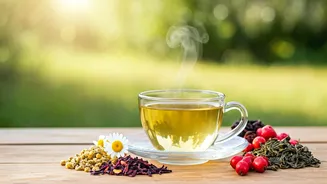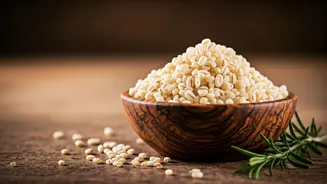Tea for Heart Health
Herbal teas have long been celebrated for their potential health benefits, and when it comes to heart health, certain varieties stand out. These teas offer
a natural approach to supporting cardiovascular wellness. This exploration delves into the details of these teas, providing practical information to assist you in making informed decisions about your health, enabling you to integrate these into your everyday lifestyle. It is important to remember that these are complementary measures to any health care professionals' advice.
Hibiscus: A Floral Elixir
Hibiscus tea, known for its vibrant red color and tart flavor, is not just a refreshing drink; it's also a potential ally in heart health. Research has indicated that regular consumption of hibiscus tea can contribute to lower blood pressure levels. The tea is rich in antioxidants that help combat harmful free radicals and protect the cardiovascular system. Hibiscus tea is easy to prepare; simply steep the dried hibiscus flowers in hot water. Enjoying a cup of hibiscus tea can be a pleasant and healthy addition to your daily habits. As always, consult your healthcare provider for specific medical advice.
Green Tea's Beneficial Effects
Green tea, a staple in many cultures, is also a powerful beverage for heart health. Green tea is full of catechins, a type of antioxidant that may help lower LDL cholesterol levels—often referred to as 'bad' cholesterol—and protect against arterial damage. These antioxidants help prevent the oxidation of LDL cholesterol, which is a key factor in the development of atherosclerosis, a condition where arteries become clogged with plaque. To prepare green tea, steep the leaves in hot, but not boiling, water for a few minutes. Consistent consumption of green tea can be an effective way to improve your heart's wellbeing. Consult with your doctor to understand the benefits that green tea could offer you, specifically.
Hawthorn Berry for Circulation
Hawthorn berry tea has a long history of use in traditional medicine, particularly for cardiovascular support. It's believed to improve circulation and strengthen the heart muscle. The compounds within hawthorn berries help dilate blood vessels, which can improve blood flow and reduce the strain on the heart. Hawthorn berry tea is often prepared using dried berries, flowers, or leaves. It is believed that it helps lower blood pressure and protect against heart disease. Before using hawthorn berry tea, it's wise to speak with your doctor, as it can interact with certain medications.
Oolong Tea's Advantages
Oolong tea, a partially oxidized tea, presents another option for supporting heart health. Studies suggest that regular oolong tea consumption can help reduce cholesterol levels. Oolong tea contains polyphenols that are believed to help lower triglyceride levels and promote the breakdown of fats in the body. To prepare oolong tea, steep the leaves in hot water for a few minutes. Like green tea, oolong tea contains antioxidants that offer protection against free radical damage. Integrating oolong tea into your daily regimen is a simple step towards cardiovascular health, however, you should always consult your doctor for any specific medical questions or advice.
Black Tea's Potential Benefits
Black tea, a common beverage enjoyed worldwide, also brings some potential heart-healthy benefits to the table. Some studies suggest that black tea may help improve blood vessel function and reduce the risk of stroke. It contains flavonoids, antioxidants that contribute to arterial health and help reduce the risk of blood clots. It is also believed that drinking black tea regularly can assist in lowering LDL cholesterol levels. For optimal benefits, it's best to steep black tea for a few minutes. While black tea can be a part of a heart-healthy diet, remember to discuss any changes to your diet with your healthcare provider.




















